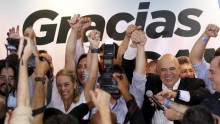The elections to the legislative body, which were held on Sunday, resulted in a complete victory for the Venezuelan opposition. According to the National Electoral Council, 99 of the 167 seats were won by the coalition of opposition parties Democratic Unity Roundtable (MUD), reports DPA agency. Even before the official results of the elections were published, Henrique Capriles Radonski, MUD’s chairman had said: “The elections went according to how we expected.” Nineteen million voters had the right to vote on Sunday. Socialist President Nicolas Maduro has recognized the outcome of the vote and called it “disappointing.”
So, for the first time in 17 years a majority in parliament – the National Assembly – will not be controlled by left-wing forces. Latin American country is in deep economic crisis, the main reason for which is the rapid decline in oil prices. Energy exports provide most of the revenue for Caracas. Venezuela has the world’s largest proven oil reserves.
The Day turned to Oleksandra Kovaliova, expert in international affairs, to comment on the election results in this Latin-American country and to predict further developments.
“It is necessary to consider the situation in Venezuela before the elections and even before the decline in the oil price which hit the Venezuelan economy, focused on oil production. One should also consider all the years that preceded Chavez’s rule.
“Seventeen years ago when Chavez came to power, there was a very strong economic crisis in the country. Venezuelan society was much divided both in terms of economy and race. The society had no social mobility. People had not actually been able to change their lives for the better. Then, Chavez has given the poor people opportunities, including schooling and housing.
“But what has not been done and what led to the victory of the opposition today? It is the fact that industrialization didn’t take place in the country. And the income inequality was never tackled. Most people began to live better because of subsidies they received from the state income from oil sales. But when oil prices began to fall abruptly, the jobless population that relied on subsidies felt the change for the worse.
“The principal question now is what is going to happen in the country next. Today, the opposition won and controls 99 out of 167 seats in parliament; but 12 seats are still contested. Everything depends on how they are distributed. If the opposition will get those 12 seats, it will be able to change the constitution completely. But even the position they have received now is enough to block or undermine government initiatives.
“It is believed that a conflict between supporters of the government and opposition supporters may develop. The opposition will try to bring the case to impeachment and overthrow the government. And this is the most likely scenario. Regarding that conflict there is one issue: we do not know what the majority will do – those people who had begun to live much better in Chavez’s years, and have returned to poverty in the past two years. We do not know whether they would support the government, or actually dare confront it.
“A lot depends on the position of the US; it is unclear whether they decide to put pressure on Maduro’s government and continue playing with oil prices.
“The victory of the opposition for the first time in 17 years is a warning sign that the government should resign. On the other hand, it couldn’t have been the other way, because Chavez supported his rule entirely on his charismatic personality. Maduro doesn’t have his charisma. Also, Chavez had a high level of education. He was a soldier, a strategist. Nowadays, no people with strategic vision are left in the government.
“In the coming day we must wait for the situation with those 12 seats distribution to end. The problem for the opposition is that in order to change anything, they need not only the majority; they need the 99 seats plus those 12. If they have them, everything will be simple for the opposition; they would change the constitution. Otherwise, they will only be able to influence the decisions on some issues. In this situation, the government is unlikely to willingly retire.
“Democratic Unity Committee consists of more than 20 parties, which in particular include not only right or centrist parties, but even some extreme left ones. It is absolutely amazing. For the first time in the Venezuelan history, the opposition has united such a broad composition of political spectrum.
“It is difficult to say in which direction Venezuela will move. But if the opposition really comes to power, privatization will definitely happen. Over the years, many companies were unprofitable and relied on state subsidies. And there was no industrialization. But a country that is dependent on oil and petroleum economics, the country that relies on its raw materials, is a relic. One can understand the resentment of the population majority; the country that received huge profits from the sale of oil did not use them to develop. And all the indexes remained at the same levels for many years. The situation in Venezuela can be compared to Russia.
“As for the opposition leaders, there are several prominent figures, but one cannot say that they have any kind of unity between them, or that they are consolidated around a common idea.”








